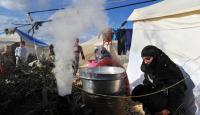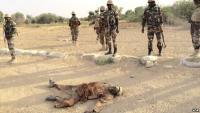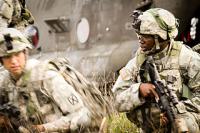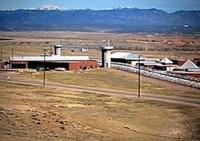-
Climate change heightening the risk of conflict and war
Thirty of Australia’s leading minds from defense, academia, policy think tanks, and other government agencies have joined together for discussions over two days last week for Australia’s first climate security summit. The summit participants agreed that increasing temperatures, rising sea levels, changing rainfall patterns, and more frequent and severe extreme weather events are heightening the risk of conflict and increasing the displacement of people. The summit organizers quote Brigadier-General Wendell Christopher King (Ret.), the Chief Academic Officer at the U.S. Army’s Command and General Staff College, who said: “[Climate change] is like getting embroiled in a war that lasts 100 years — there is no exit-strategy.”
-
-
Legislation would give U.K. police powers to access U.K. computer users’ browsing history
The U.K. police and intelligence service, ahead of the publication this coming Wednesday of legislation on regulating surveillance powers, have urged the government to give them the power to view the Internet browsing history of British computer users. Senior officers were pressuring the government to revive measures which would require telecommunications companies to retain for twelve months data which would reveal Web sites visited by customers. The police and intelligence agencies argue that such measures are necessary because the scale of online activity has made traditional methods of surveillance and investigation less useful.
-
-
Centralized leadership, major reform needed to bolster U.S. biodefense
A comprehensive report on U.S. biodefense efforts calls for major reforms to strengthen America’s ability to confront intentionally introduced, accidentally released, and naturally occurring biological threats. The report details U.S. vulnerability to bioterrorism and deadly outbreaks and emphasizes the need to transform the way the U.S. government is organized to confront these threats. Recommendations include centralizing leadership in the Office of the Vice President; establishing a White House Biodefense Coordination Council; strengthening state, local, territorial, and tribal capabilities; and promoting innovation through sustained biodefense prioritization and funding.
-
-
Online tool maps terrorist networks, behavior over time
To allow a better understanding of how terrorist organizations network and function over time, the National Consortium for the Study of Terrorism and Responses to Terrorism (START) has launched the Big Allied and Dangerous (BAAD) online platform. The tool features updated, vetted, and sourced narratives and relationship information and social network data on fifty of the most notorious terrorist organizations in the world since 1998, with additional network information on more than 100 organizations. The research team plans to expand the database and online platform to include more than 600 terrorist organizations.
-
-
Carter details shift in U.S. ISIS strategy
Speaking before the Senate Armed Services Committee, Secretary of Defense Ashton Carter said that the U.S. military will intensify airstrikes and may carry out unilateral ground raids as it steps up its campaign against Islamic State. The shift in U.S. policy comes after the administration had concluded that the previous approach, which was based on equipping and training carefully vetted moderate Syrian rebels, has failed. Carter said similar missions were likely as U.S. forces adapted to the fight in Syria and Iraq.
-
-
Syria’s civil war, Europe’s refugee crisis the result of spikes in food prices: Experts

The disintegration of Syria and Europe’s refugee crisis are only the latest tragic consequences of two spikes in food prices in 2007-08 and 2010-11 that triggered waves of global unrest, including the Arab Spring. Researchers have traced these spikes and spiraling crises to their root causes: deregulated commodity markets, financial speculation, and a misguided U.S. corn-to-ethanol fuel policy which removes nearly five billion bushels of corn from markets each year.
-
-
Obama considering deploying U.S. troops inside Syria, closer to front lines with ISIS
Defense Secretary Ashton Carter and other top national security officials have presented President Barack Obama with their recommendation to move U.S. ground troops into areas in Syria and Iraq, and have them assume battlefield-related roles, which would likely bring them into direct contact with Islamic State militants. The proposals reflect a growing recognition that the strategy the United States has pursued against ISIS so far has failed to deliver satisfactory results.
-
-
Justin Trudeau: Canada will withdraw its fighter jets from anti-ISIS campaign
Canadian Liberal prime minister-designate Justin Trudeau, in his first press conference after leading the Liberal Party back into power in Monday’s federal election, has confirmed that Canada will withdraw its fighter jets from the U.S.-led coalition conducting operations against Islamic State in Iraq and Syria. Canada currently has six CF-18 fighter jets taking part in the U.S.-led bombing campaign. The outgoing Harper government planned to keep the fighter jets in the region until March 2016. Canada has also deployed about seventy Special Forces troops to northern Iraq to train Kurds. During the election campaign Trudeau appeared to indicate that this mission would continue.
-
-
ACLU lawsuit seeks disclosure of details of CIA drone program
The American Civil Liberties Union (ACLU) is continuing its campaign over CIA drone use with a lawsuit filed on Monday to force the CIA to turn over details about the U.S. clandestine drone war program. The ACLU lawsuit, coming a week after some of details of the program were leaked, asks for summary data from the CIA on drone strikes, including the locations and dates of strikes, the number of people killed and their identities or status.
-
-
U.K. launching broad anti-extremism strategy
Amid growing concerns about the growth of home-grown terrorism, British prime minister David Camron has announce that the government will spend millions on funding anti-extremism projects in communities and tackling online attempts to radicalize vulnerable Britons. The new funding would be used to providing direct support to groups to expand the reach and scale of their work to confront extremism. Projects will include social media training and technical assistance to enable small charities to set up Web sites. “We need to systematically confront and challenge extremism and the ideologies that underpin it, exposing the lies and the destructive consequences it leaves in its wake. We have to stop it at the start — stop this seed of hatred even being planted in people’s minds and cut off the oxygen it needs to grow,” Cameron said.
-
-
Justice Department created new office to focus on domestic terrorists
The Justice Department said this week that it has created a new office which would on homegrown extremists. Assistant Attorney General John P. Carlin announced the move on Wednesday. He said the new office, the Domestic Terrorism Counsel, will be the main point of contact for federal prosecutors working on domestic terrorism cases. Carlin said the new office was created “in recognition of a growing number of potential domestic terrorism matters around the United States.” Following the 9/11 attacks, U.S. law enforcement had shifted its attention, and the allocation of law enforcement and intelligence resources, from domestic to foreign terrorism. The result, security experts say, was that federal authorities had lost sight of domestic extremists. “Looking back over the past few years, it is clear that domestic terrorists and homegrown violent extremists remain a real and present danger to the United States. We recognize that, over the past few years, more people have died in this country in attacks by domestic extremists than in attacks associated with international terrorist groups,” Carlin said.
-
-
U.S. deploys 300 U.S. troops to Cameroon to bolster campaign against Boko Haram

President Barack Obama on Wednesday notified the Congress of his plan to deploy 300 troops to Cameroon to provide intelligence, surveillance, and reconnaissance operations to the militaries of Nigeria, Cameroon, Chad, and Niger as they battle the Islamist Boko Haram insurgents. In a letter released by the White House, the president said ninety personnel had already been deployed, and that they would be armed for self-defense. A senior administration official said the deployment was “part of the counter Boko Haram effort.”
-
-
U.S. tries to persuade Pakistan not to deploy small tactical nuclear weapons

Pakistani Prime Minister Nawaz Sharif is coming to the United States next week on an official visit, and ahead of the visit the Obama administration is holding talks with Pakistani officials about Pakistan’s plan to deploy a small tactical nuclear weapon which would be more difficult to monitor and secure than Pakistan’s arsenal of larger weapons. U.S. officials fear that the smaller weapons are easier to steal, or would be easier to use should they fall into the hands of a rogue commander. “All it takes is one commander with secret radical sympathies, and you have a big problem,” said one former official.
-
-
U.S. to keep 5,500 troops in Afghanistan beyond January 2017

The United States will keep U.S. troops in Afghanistan beyond next year in response to Taliban advances. President Barack Obama was elected in 2008 promising to end U.S. ground involvement in Afghanistan before leaving office in January 2017, but he now admits that that promise cannot be kept. Obama will later today announce that 5,500 troops will remain in Afghanistan beyond January 2017. The present contingent of 9,800 U.S. troops would remain throughout most of next year, being reduced to 5,500 in 2017.
-
-
Pentagon inspects two Colorado prisons for Guantánamo detainees

A U.S. Defense Department team is spending three days this week in Colorado to determine whether two prisons in the state would be suitable for holding dozens of Guantánamo detainees indefinitely. The latest effort by President Barack Obama to close Guantánamo Bay involves inspecting a federal Supermax in Florence and a state penitentiary at Canon City to determine the feasibility of using them to continue the detention of men, currently at Guantánamo, who would not be charged or released by the United States. Colorado lawmakers oppose the move, and critics of the administration say the problem with Guantánamo is not its location, but the practice of indefinite detention without charge far from any active battlefield and the use of military tribunals – and these will not change in a U.S. domestic facility.
-
- All
- Regional
- Water
- Biometrics
- Borders/Immig
- Business
- Cybersecurity
- Detection
- Disasters
- Government
- Infrastructure
- International
- Public health
- Public Safety
- Communication interoperabillity
- Emergency services
- Emergency medical services
- Fire
- First response
- IEDs
- Law Enforcement
- Law Enforcement Technology
- Military technology
- Nonlethal weapons
- Nuclear weapons
- Personal protection equipment
- Police
- Notification /alert systems
- Situational awareness
- Weapons systems
- Sci-Tech
- Sector Reports
- Surveillance
- Transportation
Advertising & Marketing: advertise@newswirepubs.com
Editorial: editor@newswirepubs.com
General: info@newswirepubs.com
2010-2011 © News Wire Publications, LLC News Wire Publications, LLC
220 Old Country Road | Suite 200 | Mineola | New York | 11501
Permissions and Policies
Editorial: editor@newswirepubs.com
General: info@newswirepubs.com
2010-2011 © News Wire Publications, LLC News Wire Publications, LLC
220 Old Country Road | Suite 200 | Mineola | New York | 11501
Permissions and Policies
